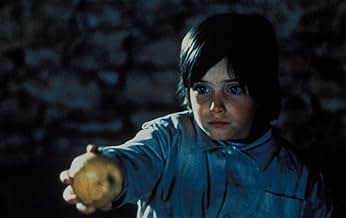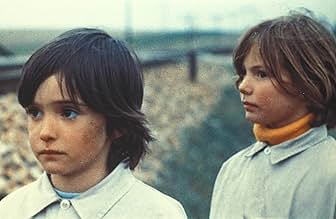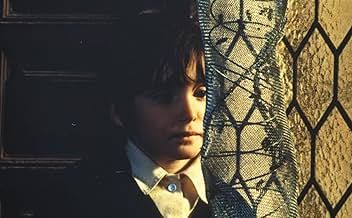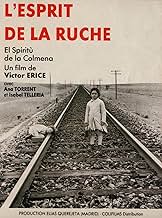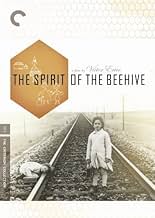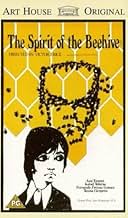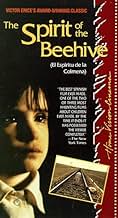Nella Spagna del 1940, dopo aver visto ed essere stato traumatizzato dal film "Frankenstein" (1931), una sensibile bambina di sette anni naviga nel proprio mondo fantastico.Nella Spagna del 1940, dopo aver visto ed essere stato traumatizzato dal film "Frankenstein" (1931), una sensibile bambina di sette anni naviga nel proprio mondo fantastico.Nella Spagna del 1940, dopo aver visto ed essere stato traumatizzato dal film "Frankenstein" (1931), una sensibile bambina di sette anni naviga nel proprio mondo fantastico.
- Regia
- Sceneggiatura
- Star
- Premi
- 7 vittorie e 1 candidatura in totale
Recensioni in evidenza
The story is elliptically told and demands your participation in making sense of the narrative, but it's also leisurely paced and allows you to breathe in the atmosphere rather than forcing a particular reading on you. One thing you wouldn't guess from reading the other comments is how this is as much a film about nature as about history--it is like a poem of the countryside in winter, with long vistas of stone farmhouses framed against the rising sun. The film with the most similar visual palette is Malick's "Days of Heaven", but that film feels simplistic compared to the full immersion in history and memory presented in this film--a much more complete vision of the past.
Ana Torrent is unforgettable. I can think of no better film about children, yet (as with so many other things in this movie) it doesn't feel forced--these kids aren't just the director's pawns, but real, living beings.
If you get a chance to see it, definitely make the effort.
Without using much dialogue in the movie, Erice artistically comments on the political tension in Spain through potent images and scenes. He uses symbols such as the two young sisters to represent the division between the Republican and Nationalist parties, and the leitmotif of the beehive to represent the "trapped" workers in Spain under Franco. The most amazing aspect is that all of the post-war commentary is said without any words and without mentioning the actual event! It is a "cine de espectáculo," or spectacle cinema, that symbolizes the connection between fantasy in the movies and fantasy in reality. Without knowing the history of Spain, a spectator could misinterpret the movie as a commentary about the imagination of a little girl after viewing the movie "Frankenstein." The character of Frankenstein is a main component contributing to Ana's, the younger sister, interpretation of reality in Spain, and it gains meaning as Frankenstein evolves from a character in the movie to an object of fantasy. It continues to evolve into a man of flesh and bones and finally represents the hope of Ana when all other sources of information in her life turn out to be faulty.
"El espíritu de la colmena" is a powerful movie that uses many metaphors (such as Ana for the young, innocent generation of Spain) to question the interpretation of reality. It is a powerful, artistically made movie that captivates the viewer through images rather than words. It should be seen more than once in order to understand all it's hidden messages.
Ana Torrent is a wide-eyed innocent who carries the film, as we completely enter into how she integrates her daily life, both the quotidian happenings and the unusual, with scary stories her older sister teases her with and with the film. Her beautiful eyes are expressive and haunting. As someone who had an older sister with all kinds of outlandish tales that were gullibly believed, the sibling teasing is the most natural I've seen on film.
Erice has a completely original take on the Frankenstein story, no matter how many times it has been referenced in other movies. "Ana" powerfully relates to the little girl in the film, even though she does not understand any of the darker emotions or outcomes. The film inspires her to seek out misfits and outcasts, with unintended consequences and impacts on the adult world.
The adult world is the weakest part of the film, or it's so heavy with symbolism about the 1940's period when the film takes place or of the end of Francoism in Spain when the film was made that it's lost for a viewer first seeing the film today. While sometimes the parents', teachers' and servants' behavior seems mysterious if we were just seeing it from her perspective, their obliviousness and self-involvement in their own intellectual and romantic pursuits aren't really explained, even as her father's pompous hobby somehow gives the film its title. It might be some sort of commentary on how adults have their own way of blending fantasy and reality or some other political commentary.
Seen in a new 35 MM print at NYC's Film Forum, the cinematography by Luis Cuadrado was stunning. The rural scenes of fields, forest and horizon --where dangers and threats always lurk beneath the pastoral--are beautiful, with simply gorgeous looking vignettes of childhood experiences.
I wonder if this insightful look inside a child's mind influenced such films as "I'm Not Scared (Io non ho paura)" and "Paperhouse." but the film seems so fresh and creative I was surprised that it was made in 1973.
Lo sapevi?
- QuizCinematographer Luis Cuadrado was going blind at the time this film was made. An assistant would take Polaroids of the scenes and Cuadrado would direct the lighting by looking through a magnifying glass at these pictures. In 1980 Cuadrado committed suicide after he went completely blind and the tumor in his brain became too painful to face.
- BlooperWhen the fugitive jumps from the train and rolls down the hill, he's wearing boots, but in the next shot he's wearing low-cut shoes.
- Citazioni
Ana: [unable to sleep] Isabel?
Isabel: [opening her eyes] What?
Ana: [whispering] Tell me what you were going to tell me.
Isabel: [whispering] About what?
Ana: The movie.
Isabel: Not now... Tomorrow.
Ana: Now... You promised. Why did he kill the girl, and why did they kill him after that?... You don't know - you're a liar.
Isabel: They didn't kill him, and he didn't kill the girl.
Ana: How do you know? How do you know they didn't die?
Isabel: Everything in the movies is fake. It's all a trick. Besides, I've seen him alive.
Ana: Where?
Isabel: In a place I know near the village. People can't see him. He only comes out at night.
Ana: Is he a ghost?
Isabel: No, he's a spirit.
Isabel: Like the spirit Dona Lucia talks about?
Isabel: Yes, but spirits have no bodies. That's why you can't kill them.
Ana: But he had one in the movie. He had arms and feet. He had everything.
Isabel: It's a disguise they put on when they go outside...
Ana: If he only comes out at night, how can you talk to him?
Isabel: I told you he was a spirit. If you're his friend, you can talk to him whenever you want. Just close your eyes and call him... It's me, Ana... It's me Ana...
[they hear what sounds like ominous footsteps and are silent]
- ConnessioniFeatured in Sus años dorados (1980)
- Colonne sonoreOjos verdes
Written by Salvador Valverde (as Valverde), Rafael de León (as León) y Manuel L. Quiroga (as Quiroga)
I più visti
Dettagli
- Data di uscita
- Paese di origine
- Sito ufficiale
- Lingua
- Celebre anche come
- The Spirit of the Beehive
- Luoghi delle riprese
- Hoyuelos, Segovia, Castilla y León, Spagna(Town and exteriors)
- Aziende produttrici
- Vedi altri crediti dell’azienda su IMDbPro
Botteghino
- Lordo in tutto il mondo
- 190.734 USD
- Tempo di esecuzione1 ora 38 minuti
- Mix di suoni
- Proporzioni
- 1.66 : 1
Contribuisci a questa pagina


![Guarda Tráiler [OV]](https://m.media-amazon.com/images/M/MV5BZDcyMjExODEtZGJlYy00MGNmLWJhZTItNzQ5MTNjNzAzNDQ2XkEyXkFqcGdeQXRyYW5zY29kZS13b3JrZmxvdw@@._V1_QL75_UX500_CR0)
